Tag: doctor-patient communications
Patient-collected data
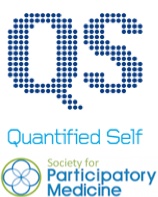 In April 2018, I participated in the 2018 Quantified Self (QS) Symposium on Cardiovascular Diseases held in San Diego. I was reminded of that session several weeks ago while attending the 2nd Annual Meeting of the Society for Participatory Medicine. In both conferences I was struck by the power of patients’ observations and measurements to manage their own diseases.
In April 2018, I participated in the 2018 Quantified Self (QS) Symposium on Cardiovascular Diseases held in San Diego. I was reminded of that session several weeks ago while attending the 2nd Annual Meeting of the Society for Participatory Medicine. In both conferences I was struck by the power of patients’ observations and measurements to manage their own diseases.
I first learned about the Quantified Self movement a few years ago while reading about Larry Smarr, an astrophysicist and computer scientist who started tracking his own exercise and weight but ultimately began expanding his self-tracking to include blood tests when he was told he had “pre-diabetes”. He ultimately diagnosed his own Crohn’s disease long before he had any symptoms based on analyzing his own blood and stool tests (including twice weekly stool microbiome analysis). He has since published a how-to guide in a biotechnology journal and participated in planning his own bowel resection for Crohn’s disease in 2016.
Hospital centered care
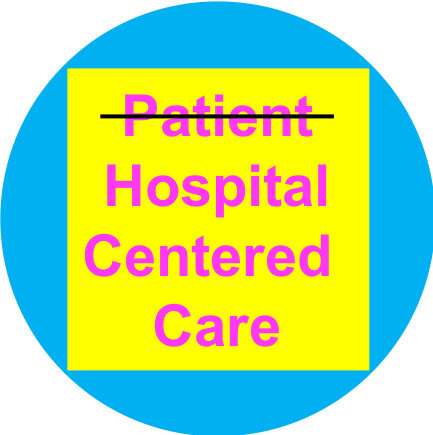 Healthcare decisions are increasingly driven by efficiency and economic factors, even at the end of life. This was brought home to me several months ago with my mother’s death after a short hospitalization for a lung infection.
Healthcare decisions are increasingly driven by efficiency and economic factors, even at the end of life. This was brought home to me several months ago with my mother’s death after a short hospitalization for a lung infection.
Because I was planning to be on vacation during the time of her hospitalization, I was able to be at her side pretty much full time, allowing me a front row seat to a series of decisions that were based on efficiency and hospital reputation rather than patient care.
Personal experiments
 During my medical training, we were taught that if a patient responds to a treatment, it doesn’t necessarily mean that every patient will respond in the same way. The results in a single patient might be due to chance so it was important to look at the results of well-designed research studies before we could conclude that the treatment really worked. In statistics, “N” refers to the sample size in an experiment so we referred to these individual observations as “N-of-1” experiments (and we did not look at them very favorably).
During my medical training, we were taught that if a patient responds to a treatment, it doesn’t necessarily mean that every patient will respond in the same way. The results in a single patient might be due to chance so it was important to look at the results of well-designed research studies before we could conclude that the treatment really worked. In statistics, “N” refers to the sample size in an experiment so we referred to these individual observations as “N-of-1” experiments (and we did not look at them very favorably).
Unfortunately, there are lots of problems with research studies – they take a long time to complete, the patients in the studies are very carefully selected and may be very different from you, there is often bias in the way the results are interpreted, etc.
What if doctors and patients had tools that allowed them to design high-quality experiments specifically for the individual patient?
Vaccines and trust
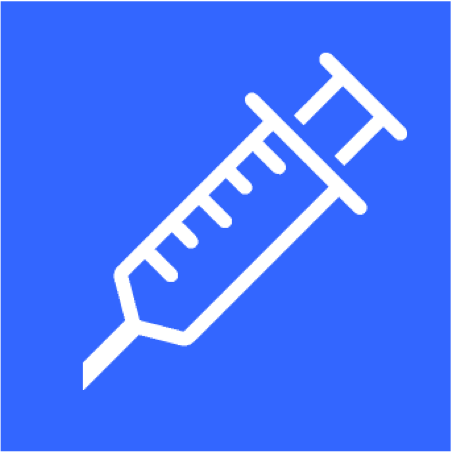 Many years ago I worked in a travel clinic advising people about the immunizations they needed before visiting other countries. Sometimes shots were required for entry into a country, such as the yellow fever vaccine. But we also made sure that MMR (measles-mumps-rubella) and other vaccines were up-to-date. The reason was that while immunizations have been very successful in getting rid of measles (and other childhood illnesses) in the US, many countries still have outbreaks. The booster shots were not necessary in the US because we no longer had cases of measles. Until now.
Many years ago I worked in a travel clinic advising people about the immunizations they needed before visiting other countries. Sometimes shots were required for entry into a country, such as the yellow fever vaccine. But we also made sure that MMR (measles-mumps-rubella) and other vaccines were up-to-date. The reason was that while immunizations have been very successful in getting rid of measles (and other childhood illnesses) in the US, many countries still have outbreaks. The booster shots were not necessary in the US because we no longer had cases of measles. Until now.
We are seeing cases of measles (and other childhood illnesses) again because parents are increasingly refusing to get their kids vaccinated. The current outbreak of measles in California is causing a lot of public debate about how to force people to get their kids vaccinated. While we may need to find new ways to enforce vaccination, we also need to restore trust – people increasingly don’t trust doctors, pharmaceutical companies, government agencies or payers.
The power of placebos
 Lots of people talk about the placebo effect but what exactly is it?
Lots of people talk about the placebo effect but what exactly is it?
The most reliable clinical studies compare a treatment that is being tested with a fake treatment (called a placebo). Generally, half the people in the study get the treatment and half get the placebo and the then the two groups are compared. In the case of pills the placebo is often a sugar pill. Researchers can even test the effectiveness of a surgical procedure by comparing it with a sham or fake procedure. In these studies (called randomized controlled trials or RCTs), patients (and their healthcare teams) don’t know who is getting the pill or procedure being studied and who is getting the placebo. The reason for this is that patients sometimes get better when they are given a placebo because they believe they will get better (called the “placebo effect”) or because their disease got better on its own.
So can patients get better just by believing they will get better? And can doctors actually prescribe placebos to help people get better?
Patients and parents as partners – part II
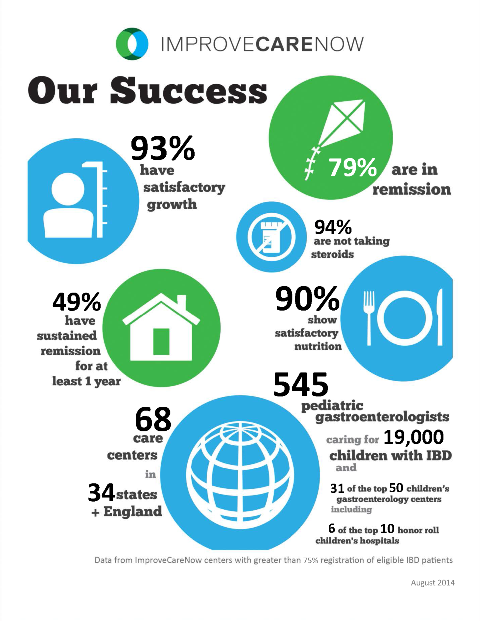 What if hospitals worked together to improve the care they deliver to patients with a particular disease (instead of competing with each other)? What if these hospitals considered patients and families their teachers and members of their teams? I’ve written before about the magic of the ImproveCareNow (ICN) network but even I am amazed at how quickly the interest in patients and parents as partners has grown within the network.
What if hospitals worked together to improve the care they deliver to patients with a particular disease (instead of competing with each other)? What if these hospitals considered patients and families their teachers and members of their teams? I’ve written before about the magic of the ImproveCareNow (ICN) network but even I am amazed at how quickly the interest in patients and parents as partners has grown within the network.
Parents as partners
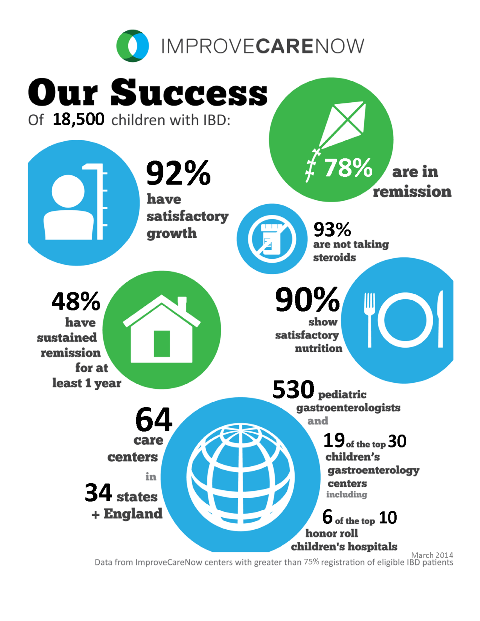 Imagine a group of medical centers that share ideas and borrow from each other in order to improve the quality of the care they deliver. Imagine care teams where doctors, nurses, nutritionists, other health professionals and researchers work side by side with pediatric patients and their parents to figure out the best ways to deliver care. Imagine a healthcare conference where patients and parents are the teachers with doctors listening attentively and asking questions.
Imagine a group of medical centers that share ideas and borrow from each other in order to improve the quality of the care they deliver. Imagine care teams where doctors, nurses, nutritionists, other health professionals and researchers work side by side with pediatric patients and their parents to figure out the best ways to deliver care. Imagine a healthcare conference where patients and parents are the teachers with doctors listening attentively and asking questions.
I just returned from the ImproveCareNow Spring Learning Session where I saw all of this firsthand. ImproveCareNow (ICN) is a network of 64 (65 as of yesterday) care centers whose mission is to
Are screening tests good for you?
If we had a serious disease, we’d like to learn about it before we even had symptoms (so we could get started on treatment). And most of us would like to know if we were at risk of developing a serious disease (so we could make changes to prevent the disease). Right?
Two recent articles in the NY Times point out the problems with screening tests.
The power of respect
Last week, I went to see my dermatologist for a full body check to make sure I don’t have melanoma. I showed up for my 3:00pm appointment a few minutes early and the receptionist said in a gruff voice, “You’re late. You had a 2:15 appointment. You can wait for the doctor to finish her office hours and be seen at the end of the day if you want”.
Hmmm….that was a little confusing since I had 3:00 in my calendar for many weeks – I made the appointment well in advance knowing that the dermatologist would need extra time for this type of appointment. So I told the receptionist that I thought there must be some mistake and asked if she could check again. By now she was really annoyed with me and said “No, you had a 2:15 appointment and it says right here that they tried to call you to confirm and your phone was out of service.” Now I was sure there was a misunderstanding since they had called to confirm my 3:00 appointment a few days earlier. So I asked her to please check that she had my name right. This time she said that I was correct (but did not offer an apology). She handed me some paperwork and said, in an accusing tone, that I was supposed to come every year and since I hadn’t been there in 3 years I had to fill out the medical history from scratch.
More on technology (and communication)
There is no question that technology can improve the quality of healthcare but it can’t replace the need for good communication.
Dr. Peter Pronovost, a leader in patient safety at Johns Hopkins, wrote a blog post today about how technology can help doctors make the right diagnosis. He cites alarming statistics about how the wrong diagnosis may cause as many as 80,000 deaths each year in the US. He discusses the exciting news that a portable bedside device that is able to measure eye movements, may prove to be useful in emergency rooms to figure out which patients who complain of dizziness are likely to be having a stroke. This development could save lives and also save time and money.
However, in many of the cases of misdiagnosis, the problem is that doctors don’t listen carefully to what patients and their families are saying. They forget that patients are the experts about their own symptoms. Doctors have a tendency to get locked into thinking about a particular diagnosis and may not listen to what patients (and their families) are telling them.